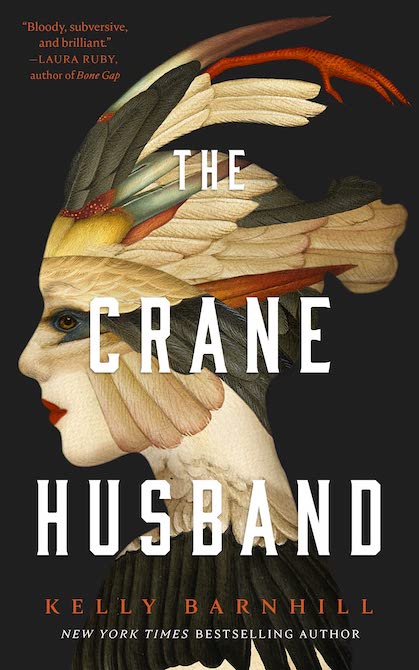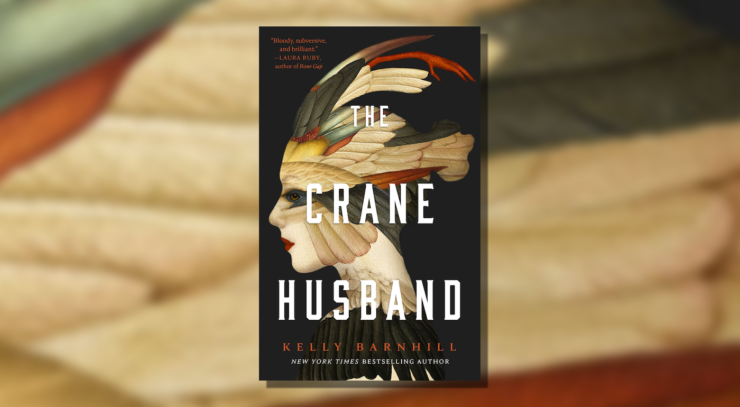“Mothers fly away like migrating birds. This is why farmers have daughters.”
We’re thrilled to share an excerpt from Kelly Barnhill’s The Crane Husband, forthcoming from Tordotcom Publishing on February 28, 2023. In this contemporary retelling of “The Crane Wife”, one fiercely pragmatic teen forced to grow up faster than was fair will do whatever it takes to protect her family—and change the story.
A fifteen-year-old teenager is the backbone of her small Midwestern family, budgeting the household finances and raising her younger brother while her mom, a talented artist, weaves beautiful tapestries. For six years, it’s been just the three of them—her mom has brought home guests at times, but none have ever stayed.
Yet when her mom brings home a six-foot tall crane with a menacing air, the girl is powerless to prevent her mom letting the intruder into her heart, and her children’s lives. Utterly enchanted and numb to his sharp edges, her mom abandons the world around her to weave the masterpiece the crane demands.
1.
The crane came in through the front door like he owned the place. My mother walked slightly behind, her hand buried past her wrist in his feathers. He was a tall fellow. Taller than a man, by a little bit. I watched him duck his head down to pass through the low doorway leading into our elderly farmhouse. His stride was like that of any other crane, all dips and angles, forward and back, and yet. He still seemed to carry himself with an unmistakable swagger. He surveyed our house with a leer. I frowned.
I had already set the table and sliced and buttered the bread—it was stale around the edges but so it goes. I did my best to soften it under a warm, damp paper towel for a minute or two. The canned soup bubbled on the stove.
My brother, only six years old at the time, sat perfectly still in his chair, his eyes wide and solemn. He stared at the spindly gait of the crane as it stalked across the sitting room, its long neck hinging with each step, like a metronome. The crane stopped when they reached the threshold to the kitchen. He cocked his head. My mother stood by his side, her hair disheveled, her sweater drifting down the outer curve of her left shoulder. She leaned her head against him. Were they waiting to be invited in? It was her house. She had never hesitated when bringing guests over before.
Buy the Book


The Crane Husband
Granted: this was her first crane.
My brother’s mouth fell open.
“Michael,” I whispered, “keep your mouth closed.” I was fifteen and had been in charge of Michael since he was born. He did as he was told. He trusted me, utterly. Under the table, his small, warm hand found mine and hung on tight. He shut his teeth with a snap but kept his large eyes fixed on the bird.
I stared, too. I couldn’t help it. It was an enormous crane. He loomed over my mother, and she was tall to begin with. She gazed up at the crane, who gazed back. She giggled, briefly, like a girl. I pressed my mouth into a grim line. I knew what that giggle meant. She buried her other hand in his feathers, squeezing and releasing her fingers, luxuriating a bit.
“Darlings,” my mother said, “I’d like you to meet someone.”
The crane wore a man’s hat, tipped forward at what I suppose was a jaunty angle. He wore spectacles perched on his beak (razor sharp, I noticed right away). But his eyes—hard and black and keen, and so shiny it almost hurt to look at them—didn’t peer through the spectacles at all. I had a suspicion that they were just for show.
He and my mother stepped farther inside. The crane had a broken wing, bound in a splint that looked as though it had been made from two bits of wood and strips torn from one of my mother’s shirts. It rested in a sling that had all the hallmarks of my mother’s careful construction—intricate stitchwork and the occasional moment of surprising beauty. He attempted to wear shoes, like a man, but his clawed feet had already pierced through the leather and he scratched the floor with each clunk of his footsteps. The shoes, too, were just for show.
(The shoes, I noticed, were my father’s. Or had been when my father was alive. Not that I had any memory of my father wearing those shoes. Or any shoes, for that matter. My only memories of him were from his sickroom when he and I would sit for hours playing card games of my own invention, usually with names like “Who’s Got the Highest?” or “These Cards Are Now Married and Isn’t That Wonderful,” during which he would cheerfully let me win. I have only one memory from when he lay on his deathbed, but I do not think of it much.)
The crane spread his good wing around my mother. Right away, I watched as that wing slid down her back and curled over her rump. I must have made a face, because my mother instantly folded her arms and gave me a look.
“Is that any way,” she said without finishing her sentence.
I shrugged.
Michael said nothing.
“Is he staying?” I asked. I meant for dinner.
“Of course he is,” my mother said, meaning, I later realized, something else entirely.
The crane tilted his long beak down toward my mother, nuzzling her neck. The sharp tip nipped the well behind her collarbone, making a bright spot of blood. She didn’t seem to notice. But the crane did. Or, it seemed to me that he did. He puffed his feathers in a self-satisfied sort of way. I frowned. I made another place at the table and added water to the soup to spread it out among the four of us. I pulled another bowl out of the cupboard.
“What happened to his wing?” I asked, inclining my head toward the splint and the sling. The crane flinched at the mention of it.
“Surely you remember,” my mother said, soothingly running her fingers along the crane’s neck and not looking at me at all.
I shook my head. Why would I remember? But I decided to ignore this. My mom lived in her own head some- times. Artists are like that, I’m told.
“What are we to call him?” I said, more as a resignation than a question. “You haven’t exactly introduced us.” I rummaged in the drawer for an extra spoon, not wanting to look at either of them. And, in truth, I didn’t particularly care about the answer. I didn’t intend to call the crane anything at all. He’d be gone soon enough anyway. Probably by morning. I don’t think my mother had ever kept anyone around for more than a week, so I never much saw the point of learning the names of the people she brought home.
She pulled out the chairs, the legs screeching against the kitchen floor.
“Sit, my love,” she said to him and not to me. I ladled the soup into bowls and tossed salad greens that I had grown in the yard and served those, too. I hoped no one would notice the staleness of the bread. My mother sat on the crane’s lap, her arms draped across his back, her body obscured by his functional wing. The blood from her collarbone smeared across his gray feathers. He clucked and cooed, running his beak along her denimed thighs, picking at the fabric until it frayed.
Michael and I began eating. My mother still hadn’t answered the question. Michael kept his eyes tilted toward the table. I don’t think he looked up once.
Finally: “Father,” she said, her hands on either side of the crane’s face, her gaze peering into one black eye. She didn’t look at us at all. “You will call him Father.”
Fat chance, I thought waspishly.
And even though I knew enough about birds to know that they’re not much for facial expressions, there was no mistaking the bird’s randy, jubilant smirk. He puffed his feathers and preened. I slurped down my soup and excused myself from the table, saying I had homework to do—which was true, but I had no intention of actually doing it.
He won’t last, I told myself. Of course he won’t. My mother wasn’t one to keep anything around, save for me and Michael. So I wasn’t particularly worried about the crane.
I should have been worried about the crane.
Excerpted from The Crane Husband, copyright © 2022 by Kelly Barnhill.










